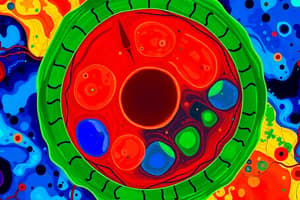Podcast
Questions and Answers
What is the main focus of cell biology?
What is the main focus of cell biology?
- Exploring the genetics of living organisms
- Investigating the behavior of various animals
- Examining the structure and function of cells (correct)
- Studying the interactions between living organisms
Which organelle is responsible for producing energy through cellular respiration?
Which organelle is responsible for producing energy through cellular respiration?
- Ribosomes
- Nucleus
- Mitochondria (correct)
- Endoplasmic reticulum (ER)
What is the function of the endoplasmic reticulum (ER) in a cell?
What is the function of the endoplasmic reticulum (ER) in a cell?
- Control center containing DNA and RNA
- Powerhouse responsible for energy production
- Protein-producing organelles
- Protein synthesis and lipid metabolism (correct)
Why is cell biology considered important?
Why is cell biology considered important?
What is the main function of the Golgi apparatus?
What is the main function of the Golgi apparatus?
Which organelle is responsible for programmed cell death?
Which organelle is responsible for programmed cell death?
What is the key process by which cells reproduce and produce new cells?
What is the key process by which cells reproduce and produce new cells?
How do peroxisomes contribute to cellular processes?
How do peroxisomes contribute to cellular processes?
In which area does cell biology have applications for developing new technologies such as gene therapy and genetic engineering?
In which area does cell biology have applications for developing new technologies such as gene therapy and genetic engineering?
What is one of the crucial applications of cell biology in the field of medicine?
What is one of the crucial applications of cell biology in the field of medicine?
Flashcards are hidden until you start studying
Study Notes
Biology: Introduction
Biology is the scientific study of living organisms and their interactions with each other and the environment. It is a vast field that encompasses various subdisciplines, such as cell biology, genetics, ecology, and many more. In this article, we will focus on cell biology, which is the branch of biology that deals with the structure, function, and behavior of cells.
Cell Biology: Overview
Cell biology is the study of the fundamental biological unit of all living organisms: the cell. It involves examining the structure, function, and behavior of cells at the molecular and subcellular levels. This field is important because it provides insights into the processes that underlie various cellular functions, such as metabolism, growth, division, and death. By understanding these processes, researchers can develop new treatments for diseases and improve our overall understanding of life.
Cell Components and Structure
Cells are composed of various organelles, which are specialized structures that perform specific functions. Some of the main organelles include:
- Nucleus: The control center of the cell, containing DNA and RNA.
- Mitochondria: The powerhouse of the cell, responsible for producing energy through cellular respiration.
- Ribosomes: Protein-producing organelles.
- Endoplasmic reticulum (ER): A network of tubules responsible for protein synthesis and lipid metabolism.
- Golgi apparatus: A stationary organelle involved in the processing, sorting, and packaging of proteins and lipids.
- Lysosomes: Membrane-bound organelles containing digestive enzymes that break down cellular waste and foreign materials.
- Peroxisomes: Organelles involved in various metabolic processes, including the breakdown of fatty acids and the production of hydrogen peroxide.
Cellular Processes and Functions
Cell biology also focuses on the processes and functions that occur within cells, such as:
- Cell division: The process by which cells reproduce and produce new cells.
- Cellular respiration: The process by which cells produce energy through the breakdown of glucose.
- DNA replication: The process by which cells create copies of their genetic material.
- Gene expression: The process by which cells transcribe and translate genetic information into proteins.
- Apoptosis: Programmed cell death, which is crucial for the development of multicellular organisms.
Applications of Cell Biology
Cell biology has numerous applications in various fields, including medicine, biotechnology, and agriculture. Some of the applications include:
- Drug development: Understanding cellular processes can help develop new drugs to target specific diseases.
- Biotechnology: Cell biology contributes to the development of new technologies, such as gene therapy and genetic engineering.
- Agriculture: Cell biology can help improve crop yields and develop new, disease-resistant plant varieties.
Conclusion
Cell biology is a crucial subdiscipline of biology that provides insights into the structure, function, and behavior of cells. By understanding these processes, researchers can develop new treatments for diseases, improve crop yields, and contribute to the development of new technologies. As our knowledge of cell biology continues to grow, we can expect even more exciting advancements in the field.
Studying That Suits You
Use AI to generate personalized quizzes and flashcards to suit your learning preferences.



